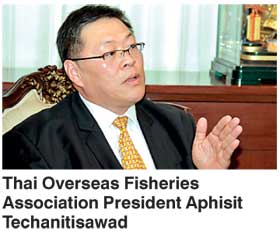Tuesday Apr 01, 2025
Tuesday Apr 01, 2025
Tuesday, 24 May 2016 00:18 - - {{hitsCtrl.values.hits}}
By Madushka Balasuriya
The Anusorn Group Thailand, one of Asia’s largest fish canneries, has identified Sri Lanka as the ideal destination to open its first overseas fish canning and dry ice manufacturing plant.
The total investment, which will include a fleet of 500 fishing vessels as well as training for local fishermen, will be to the tune of $ 200 million, $ 50 million of which will go towards building the factory.
Anusorn Group Thailand Managing Director and Thai Overseas Fisheries Association President Aphisit Techanitisawad says that  plans are at an advanced stage, with him having visited Sri Lanka earlier this year and received the go ahead for the project from Minister of Development Strategies and International Trade Malik Samarawickrama and Minister of Primary Industries Daya Gamage.
plans are at an advanced stage, with him having visited Sri Lanka earlier this year and received the go ahead for the project from Minister of Development Strategies and International Trade Malik Samarawickrama and Minister of Primary Industries Daya Gamage.
“After receiving approval from the Sri Lankan International Trade Relations Ministry, we are now discussing our investment plan for Sri Lanka with the Thai Government. We have not yet decided on where exactly the factory will be built, but it should be somewhere near the fishing ports,” revealed Techanitisawad, adding that he hoped to build it sometime in 2017 subject to clearance from the Thailand Board of Investment.
Techanitisawad is hoping the factory will serve as a bridge to the South Asian market, one which goes along with Sri Lanka’s goal of becoming a hub in the region.
“We are looking to export to India and other countries in the region. With the EU ban on SL fish due to end shortly, we hope to export there as well.”
Along with the positives to the Thai company, Techanitisawad is keen to emphasise the benefits Sri Lanka and its fisherman will gain from the venture. Thailand is the world’s biggest tuna packer, exporting $ 10 billion worth annually. A large portion of that comes from the value addition provided by companies such as the Anusorn Group, who import and re-export the final packaged product.
“We import, repack and re-export all kinds of seafood. We import because raw materials are not enough,” explained Techanitisawad. Sri Lanka faces a similar problem, in 2014 the Sri Lankan fisheries sector exported Rs. 34.7 million worth of fish, while importing Rs. 18.9 million worth.
“Sri Lanka has been importing a lot of seafood, this is not ideal for an island with so much raw material,” observed Techanitisawad.
“Sri Lanka has a lot of potential to develop and create jobs for local fishermen but the technology that their fishermen use is far behind that of modern fishing standards.”
The Anusorn Group is in partnership with 500 fisherman who have their own vessels, where the company provides the fishermen with equipment, training and technical assistance to help increase their catch and improve productivity. Anusorn then buys the fish that the fishermen catch at a predetermined price thanks to a forward contract.
“This will be the model we will be implementing in Sri Lanka. We will provide training, vessels and technology to SL fishermen to help catch and preserve more seafood. This will help local fisherman increase productivity going forward. Our forward agreement will also ensure that fishermen get a better price for their catch.”
Techanitisawad hopes this will lead to Sri Lanka eventually becoming be a wholly self-sufficient seafood exporter in the region.